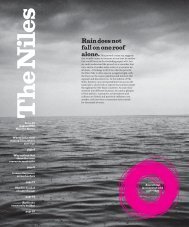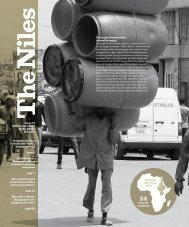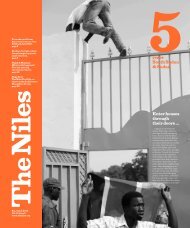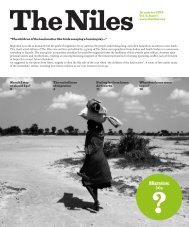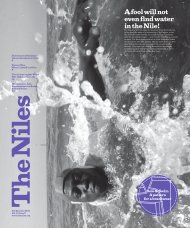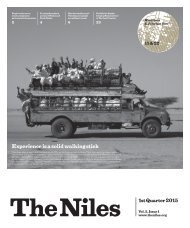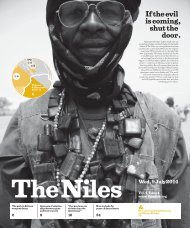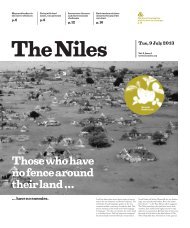When deeds speak, words are nothing
Speaking about sustainable development is easy. Acting sustainably is another matter. And now the evidence is unequivocal: Mankind’s impact on nature is causing the climate to change rapidly and drastically, threatening the environment and the very resources we need to survive. Aware that humanity is careening close to the edge, The Niles correspondents set out to explore where and how people in the Nile Basin region rethink. So much of their findings for now: We are an endlessly innovative species. Cooperation is our superpower. When deeds speak, words are nothing.
Speaking about sustainable development is easy. Acting sustainably is another matter. And now the evidence is unequivocal: Mankind’s impact on nature is causing the climate to change rapidly and drastically, threatening the environment and the very resources we need to survive. Aware that humanity is careening close to the edge, The Niles correspondents set out to explore where and how people in the Nile Basin region rethink. So much of their findings for now: We are an endlessly innovative species. Cooperation is our superpower. When deeds speak, words are nothing.
You also want an ePaper? Increase the reach of your titles
YUMPU automatically turns print PDFs into web optimized ePapers that Google loves.
Otieno Ngare, a member of
the same fishing squad with
Odongo, watches his colleagues
setting out for the night. Four
to five fishermen generally share
a boat. About ten teams go out
at a time, mainly on the darkest
nights of the moon cycle.
Two solar-powered lights are
floating on the lake as the fishermen
cast their nets to catch the
Lake Victoria sardine.
as compared to USD 30 for a kerosene lamp.
Not all fishermen can afford solar panels, so
they recharge from the energy stations at the
cost of about 70-100 Kenya Shillings (USD 1)
per lamp. This is much cheaper than when they
used kerosene. The amount of kerosene consumed
in 12 hours costs approximately USD 10.
Once fully charged, the solar light can run
for the whole night, convenient as the fishermen
can spend up to 12 hours on their boats.
“Before, we used to take hours just to light
one kerosene lamp, but now we only switch
a button, and we are ready to go. It has saved
us a lot of time, and [we are] now able to do
other businesses such as tomato farming,” said
Michael Kepha, former Beach Management
Unit Chair and a fisherman on the island.
Besides serving fishers, solar lamps are
also being adopted in island homes, seeing
that many households do not have access to electricity.
The solar lamps were introduced on the
island about six years ago, and today, almost all
fishermen use them.
Fish stocks under threat
An increase in global temperatures, rising
sea levels, changing precipitation patterns,
and a rise in extreme weather conditions
are threatening human health, safety, food
security, water security, and socioeconomic
development in Africa, according to the World
Meteorological Association.
The fishing sector in Kenya has undergone
a tremendous transformation, from
a local-based subsistence fishery to a commercialised
industry today. But this sector
is significantly impacted by climate change.
Kenya is highly vulnerable to climatic
changes, with projections suggesting that
its temperature will rise by 2.5 degrees
Celsius between 2000 and 2050. Even
the slightest increase in droughts and
floods will present major challenges to
food security and water availability, according
to a Christian Aid report released
in May 2021.
At around 11 p.m., Otieno Ngare
retrieves his casted net containing
some fish. He will revisit the
lamps every hour to check for
his catch.
Continued on page 33 31









